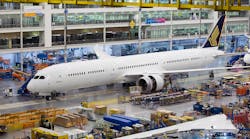The federal National Labor Relations Board last week filed a complaint against Boeing Co., claiming the aircraft builder unlawfully fired and disciplined workers at its North Charleston, S.C., assembly plant because they were involved in an effort to unionize employees there. The NLRB case is based on multiple complaints brought by the International Assn. of Machinists, which for several years has tried to organize workers at the South Carolina plant.
Last September NLRB ruled in favor of Boeing Co. in a dispute over the rights of South Carolina workers to affiliate with the union. In a three-to-one vote, the federal panel at that time said a proposed bargaining unit comprising workers of two different job descriptions did not meet federal standards, because those workers were not distinct from the North Charleston Final Assembly operation's larger workforce of about 2,700 maintenance and production workers.
The South Carolina plant is one of two locations where Boeing assembles its 787 Dreamliner wide-body aircraft. Workers there twice (2015, 2017) rejected IAM organizing efforts by majority votes. The union represents thousands of other Boeing workers in other states, and in the 2019 case was seeking to unionize a subset of the total workforce.
However, the current filing alleges Boeing fired five workers and its managers issued verbal warnings to employees who favored union representation. In one example cited, a Boeing manager allegedly threatened to replace workers with contractors if they endorsed the IAM proposal.
Boeing has refuted all of the charges, and asserted the NLRB case allegations are without merit.
Boeing maintains that it supports fair treatment of employees and does not tolerate retaliation against workers for any reason.
A formal answer to the complaint is due within two weeks, and the case may proceed to trial or negotiation.






